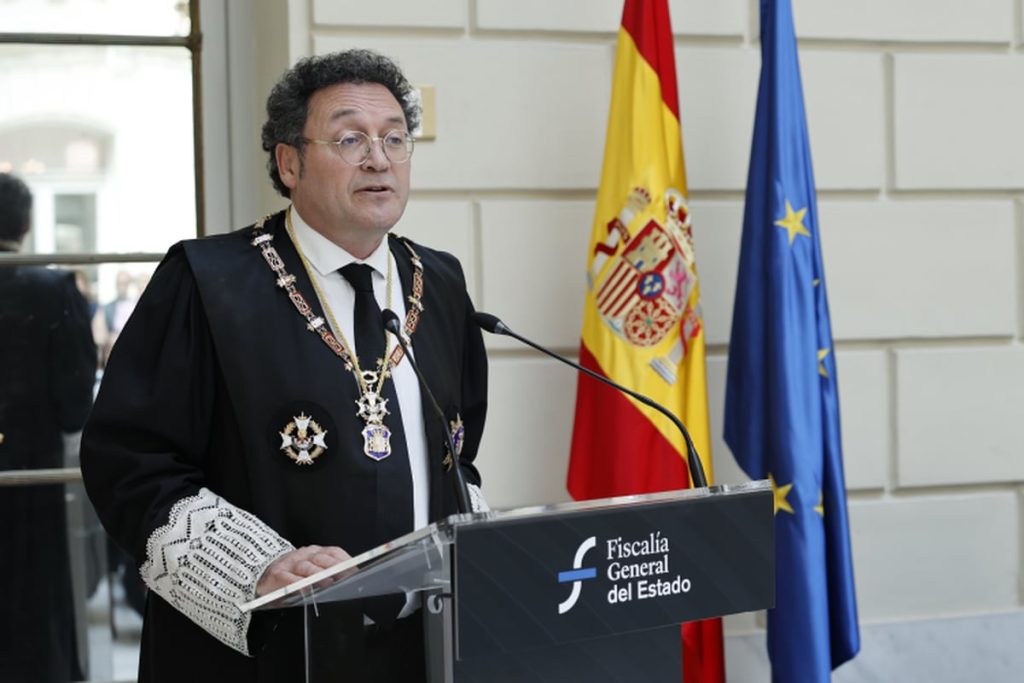The drums of war are once again being heard in the Prosecutor’s Office. Álvaro García Ortiz, the Attorney General of the State, issued a statement on Monday to support the actions of the Madrid Provincial Prosecutor’s Office in the case of Alberto González Amador, partner of Isabel Díaz Ayuso, president of the Madrid Community. Garcia Ortiz, who is facing opposition from the conservative sector of the legal profession and criticism from the Popular Party, has taken the initiative in response to the cracks that have begun to appear within the organization following the filing of two complaints against the institution. These complaints were a result of a press release issued by the Prosecutor’s Office that refuted distorted information being spread by Ayuso’s team regarding the legal proceedings against her partner, who is currently under investigation for tax fraud and document forgery. Garcia Ortiz stated, “I take ultimate responsibility for that press release.”
The Attorney General, who is engaged in a power struggle with the conservative sector of the legal profession and facing criticism from the Popular Party, has taken a bold step by publicly defending his subordinates at the Madrid Provincial Prosecutor’s Office. He denied any illegality on the part of the Prosecution in issuing the press release regarding Ayuso’s partner. He emphasized the importance of the public’s right to receive truthful information, as enshrined in the Spanish Constitution, and reiterated that the Prosecution’s communication did not contain any information that could compromise the right to defense or reveal confidential data with procedural implications. Garcia Ortiz emphasized that the Prosecution’s actions are always within the bounds of the law.
The controversy arose following the press release on March 14th, which contradicted Ayuso’s team’s claims that the Prosecution had offered a deal to her partner, when in fact it was the opposite. As a result, two complaints were filed against the Prosecution, accusing them of disclosing confidential information. The Madrid Bar Association and Alberto González Amador filed these complaints. The first complaint, which was addressed by a Prosecutor from the Madrid Provincial Prosecutor’s Office, opposed its admission and denied the revelation of confidential information, stating that no new information had been disclosed. A second Prosecutor, however, took a contrary stance and detected potential criminal behavior related to the same events, leading to parallel investigations handled by different prosecutors.
In response to the diverging opinions within the Prosecution, the Deputy Attorney General, María Ángeles Sánchez Conde, has intervened to ensure a unified stance. She emphasized that the Prosecution cannot take contradictory positions on the same issue, expressed her lack of suspicion of criminal conduct, and deemed the preliminary inquiries initiated by the Prosecutor in question as inappropriate. In his institutional statement, Garcia Ortiz publicly supported the prosecutors involved in the case and emphasized that he would not tolerate any repercussions for their transparent actions. He made it clear that he takes full responsibility for the press release issued by the Prosecution and affirmed his commitment to upholding the rule of law within the institution.
The internal conflicts within the Prosecutor’s Office have raised concerns about the integrity and independence of the legal profession, particularly in high-profile cases involving public figures. The controversy surrounding Ayuso’s partner’s legal case and the subsequent fallout within the Prosecution highlight the challenges faced by prosecutors in maintaining impartiality and transparency in their work. Ultimately, the outcome of this internal dispute will have broader implications for the functioning of the Prosecution and the perception of justice in Spain. It remains to be seen how the Attorney General’s intervention and efforts to resolve the conflict will impact the future operations of the Prosecutor’s Office and its ability to uphold the rule of law.


